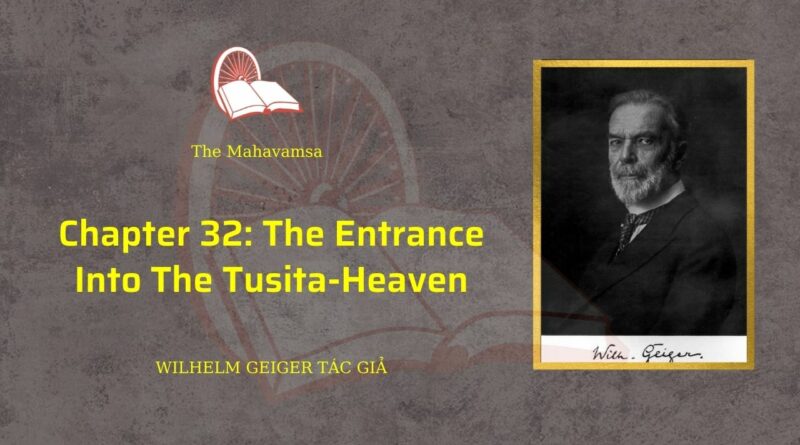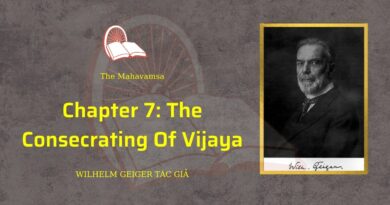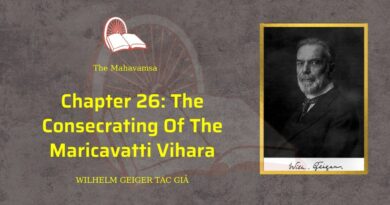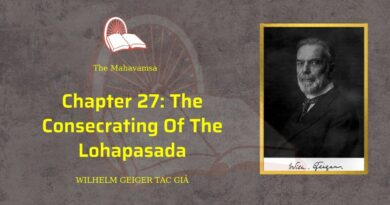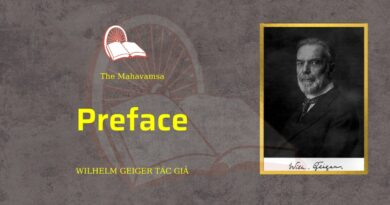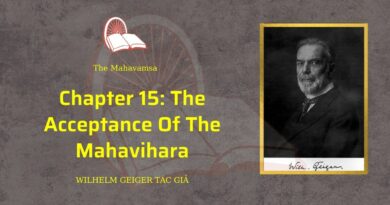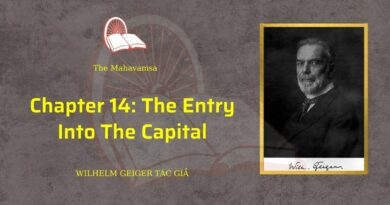THE MAHAVAMSA – CHAPTER 32: THE ENTRANCE INTO THE TUSITA-HEAVEN
ERE yet the making of the chatta and the plaster-work’ on the cetiya was finished the king fell sick with a sickness that was (fated) to be mortal. He sent for his younger brother Tissa from Dighavapi. and said to him: ‘Complete thou the work of the thüpa that is not yet finished.’ Because of his brother’s weakness he had a covering made of white cloths by seamsters and therewith was the cetiya covered, and thereon did he command painters to make on it a vedika duly and rows of filled vases likewise and the row with the five-finger ornament. And he had a chatta made of bamboo-reeds by plaiters of reeds and on the upper vedika a sun and moon of kharapatta. And when he had had this (thüpa) painted cunningly with lacquer and kankutthaka he declared to the king: ‘That which was yet to do to the thüpa is completed.’
Lying on a palanquin the king went thither, and when on his palanquin he had passed round the cetiya, going toward the left, he paid homage to it at the south entrance, and as he then, lying on his right side on his couch spread upon the ground, beheld the splendid Great Thupa, and lying on his left side the splendid Lohapasada, he became glad at heart, surrounded by the brotherhood of bhikkhus.
Since they had come from here and there to have news Of the sick (king), there were (present) in that assembly ninety-six kotis of bhikkhus. The bhikkhus, group by group, recited in chorus. When the king did not see the thera Theraputtabhaya among them he thought: ‘The great warrior, who fought victoriously through twenty-eight great battles with me nor ever yielded his ground, the thera Therasutabhaya comes not now to help me, now that the death-struggle is begun, for methinks he (fore)sees my defeat.’
When the thera, who dwelt by the source of the Karindariver’ on the Paajali-mountain, knew his thought he came with a company of five hundred (bhikkhus) who had overcome the äsavas, passing through the air by his miraculous power, and he stood among those who surrounded the king. When the king saw him be was glad at heart and he bade him be seated before him and said: ‘Formerly I fought with you, the ten great warriors, by my side; now have I entered alone upon the battle with death, and the foe death I cannot conquer.’
The thera answered: ‘O great king, fear not, ruler of men. Without conquering the foe sin the foe death is unconquerable. All that has come into (this transitory) existence must necessarily perish also, perishable is all that exists; thus did the Master teach. Mortality overcomes even the Buddhas, untouched by shame or fear; therefore think thou: all that exists is perishable, full of sorrow, and unreal. In thy last mortal existence’ thy love for the true doctrine was indeed great. Albeit the world of gods was within thy sight, yet didst thou, renouncing heavenly bliss, return to this world and didst many works of merit in manifold ways. Moreover, the setting up of sole sovereignty by thee did serve to bring glory to the doctrine. Oh thou who art rich in merit, think on all those works of merit accomplished by thee even to this present day, then will all be well with thee straightway!’
When the king heard the thera’s words he was glad at heart and said: ‘In single combat also thou art my help.’
And rejoicing he forthwith commanded that the book of meritorious deeds be brought, and he bade the scribe read it aloud, and he read the book aloud:
‘Ninety-nine viharas have been built by the great king, and, with (the spending of) nineteen kotis, the Maricavattivihara; the splendid Lohapasada was built for thirty kotis. But those precious things that have been made for the Great Thupa were worth twenty kotis; the rest that, was made for the Great Thüpa by the wise (king was worth) a thousand kotis, O great king.’ Thus did he read. As he read further: ‘In the mountain-region called Kotta, at the time of the famine alled the Akkhakhayika famine, two precious ear-rings were given (by the king), and thus a goodly dish of sour millet- gruel was gotten for five great theras who had overcome the asavas, and offered’ to them with a believing heart; when, vanquished in the battle of Culaganiya, he was fleeing he proclaimed the hour (of the meal) and to the ascetic (Tissa), free from the Asavas, who came thither through the air he, without thought for himself, gave the food from his bowl’ then did the king take up the tale:
‘In the week of the consecration-festival of the (Maricavatti) vihära as at the consecration of the (Loha) pasada, in the week when the (Great) Thupa was begun even as when the relics were enshrined, a general, great and costly giving of alms was arranged by me to the great community of both (sexes) from the four quarters. I held twenty-four great Vesakha-festivals; three times did I bestow the three garments on the brotherhood of the island.
Five times, each time for seven days, have I bestowed (glad at heart) the rank of ruler of this island upon the doctrine. I have had a thousand lamps with oil and white wicks burning perpetually in twelve places, adoring the Blessed (Buddha) with this offering. Constantly in eighteen places have I bestowed on the sick the foods for the sick and remedies, as ordered by the physicians.
In forty-four places have I commanded the perpetual giving of rice-foods prepared with honey ; and in as many places lumps of rice with oil, and in even as many places great jala-cakes, baked in butter and also therewith the ordinary rice. For the uposatha-festivals I have had oil for the lamps distributed one day in every month in eight vihãras on the island of Lanka. And since I heard that a gift (by preaching) of the doctrine is more than a gift of worldly wealth I said: At the foot of the Lohapasada, in the (preacher’s) chair in the midst of the brotherhood, I will preach the Mangalasutta to the brotherhood but when I was seated there I could not preach it, from reverence for the brotherhood. Since then I have commanded the preaching of the doctrine everywhere, in the viharas of Lanka, giving rewards to the preachers. To each preacher of the doctrine did I order to give a nali of butter, molasses and sugar; moreover, I bestowed on them a handful of liquorice, four inches long, and I gave them, moreover, a pair of garments. But all this giving while that I reigned, rejoices not my heart; only the two gifts that I gave, without care for my life, the while I was in adversity, those gladden my heart.’
When the thera Abhaya heard this he described those two gifts, to rejoice the king’s heart withal, in manifold ways:
‘When (the one) of those five theras the thera Malayamahadeva, who received the sour millet-gruel, had given thereof to nine hundred bhikkhus on the Sumanakuta-mountain he ate of it himself. But the thera Dhammagutta who could cause the earth to quake shared it with the bhikkhus in the Kalyanika-vihara, (who were) five hundred in number, and then ate of it himself. The thera Dhammadinna, dwelling in Talanga, gave to twelve thousand (bhikkhus) in Piyangudipa and then ate of it. The thera Khuddatissa of wondrous power, who dwelt in Mangana, divided it among sixty thousand (bhikkbus) in the Kelasa (vihara) and then ate of it himself. The thera Mahavyaggha gave thereof to seven hundred (bhikkhus) in the Ukkanagara-vihara and then ate of it himself.
The thera who received the food in his dish divided it among twelve thousand bhikkhus in Piyangudipa and then ate of it himself.’
With such words as these the thera Abhaya gladdened the king’s mood, and the king, rejoicing in his heart, spoke thus to the thera:
‘Twenty-four years have I been a patron of the brotherhood, and my body shall also be a patron of the brotherhood. In a place whence the Great Thupa may be seen, in the malaka (bounded about) for the ceremonial acts of the brotherhood, do ye burn the body of me the servant of the brotherhood.’
To his younger brother he said: ‘All the work of the Great Thüpa which is still unfinished, do thou complete, my dear Tissa, caring duly for it. Evening and morning offer thou flowers at the Great Thupa and three times (in the day) command a solemn oblation at the Great Thupa. All the ceremonies introduced by me in honour of the doctrine of the Blessed (Buddha) do thou carry on, my dear, stinting nothing. Never grow weary, my dear, in duty toward the brotherhood.’ When he had thus exhorted him, the king fell into silence.
At this moment the brotherhood of bhikkhus began the chanting in chorus, and the devatas led thither six cars with six gods, and severally the gods implored the king as they stood in their cars: ‘Enter into our delightful celestial world, O king.’
When the king heard their words he stayed them with a gesture of his hand: ‘Wait ye as long as I listen to the dhamma.’ Then the bhikkhus thinking: ‘He would fain stop the chanting in chorus,’ ceased from their recitations; the king asked the reason of the interruption. ‘Because the sign (to bid us) sbe still” was given,’ they answered. But the king said: ‘It is not so, venerable sirs,’ and he told them what had passed.
When they heard this, certain of the people thought:
‘Seized by the fear of death, he wanders in his speech.’ And to banish their doubts the thera Abhaya spoke thus to the king: ‘How would it be possible to make known (the presence of) the cars that have been brought hither?’ The wise king commanded that garlands of flowers be flung into the air, these severally wound themselves around the poles of the cars and hung loose from them.
When the people saw them floating free in the air, they conquered their doubts; but the king said to the thera:
‘Which of the celestial worlds is the most beautiful, venerable sir?’ And the other answered: ‘The city of the Tusitas, O king, is the fairest; so think the pious. Awaiting the time when he shall become a Buddha, the compassionate Bodhisatta Metteyya dwells in the Tusita-city.’
When the most wise king heard these words of the thera, he, casting a glance at the Great Thupa, closed his eyes as he lay.
And when he, even at that moment, had passed away, he was seen, reborn and standing in celestial form in the ear that bad come from Tusita-heaven. And to make manifest the reward of the works of merit performed by him he drove, showing himself in all his glory to the people, standing on the same car, three times around the Great Thupa, going to the left, and then, when he had done homage to the thüpa and the brotherhood he passed into the Tusita-heaven.
Even where the dancing-women who had come thither laid off their head-ornaments there was a hail built called Makutamuttasala. Even where the people, when the body of the king was laid on the funeral pyre, broke into wailing there was the so-called Ravivattisala built.
The mälaka outside the precincts (of the monastery), in which they burned the body of the king here bears the name Rajamalaka.
The great king Dutthagamani, he who is worthy of the name of king, will be the first disciple of the sublime Metteyya, the king’s father (will be) his father’ and the mother his mother.’ The younger brother Saddhatissa will be his second disciple, but Salirajakumara, the king’s son, will be the son of the sublime Metteyya.
He who, holding the good life to be the greatest (good), does works of merit, passes, covering over much that perchance is evil-doing, into heaven as into his own house; therefore will the wise man continually take delight in works of merit.

